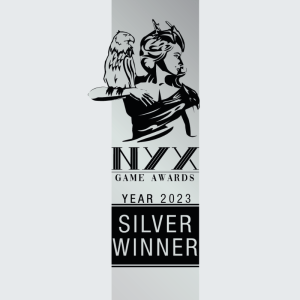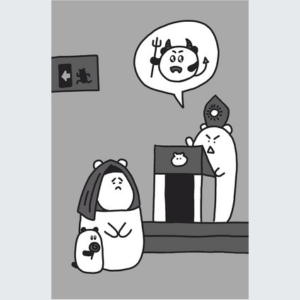Yitong Hu, GPM Class of 2020, recently won an NYX Award in Game Design – Storyline for her linear narrative title, Black White Bear, now available on itch.io. We had the pleasure of interviewing Yitong to see what she’s been up to since graduating from the GPM MS program, and learn more about the thought and care that has gone into designing and developing Black White Bear. To stay up to date on Yitong and Black White Bear, follow BugOnDesk on Twitter.
Since graduating from GPM, what have you been working on?
I have developed educational games for VR, PC, and mobile platforms across a range of industries. Additionally, I have created several prototypes for multiplayer competitive games while working at a AAA studio. Currently, I am employed as a technical designer for a cosmic horror game.
What inspired you to create Black White Bear? And what inspired you to enter it in the NYX contest?

I have been wanting to create a linear narrative game that tells the stories of LGBTQ+ and other underrepresented communities for many years, in order to fill the gap in the market for such a topic. Over the past decade living in Malaysia and the United States, I have had the privilege of meeting people from diverse backgrounds and professions, and their life philosophies and unique personalities have inspired and educated me greatly. After completing the demo for Black White Bear, I wanted to showcase the story to a wider audience through participating in competitions and receive more feedback.
Black White Bear, in all its simplicity, makes an indelible impact on the player. Which part of the game do you attribute that to? Character development? Art? Music?
Black White Bear is a game demo I created entirely by myself, which means I took on the responsibilities of story writing, level design, programming, 2D art, UI, and audio design. Currently, several talented designers and artists are assisting me in re-drawing the animations and UI in the game. They also provide valuable feedback on various aspects of the game. However, the level design, narrative design, and programming are still completed by me alone.
Is the end product we see any different than the original concept you created? If so, in what way?
The full game will have four chapters that describe four different periods of the orphaned panda’s life journey. There will be more mini puzzles, and better visual and sound effects.
Do you have any advice for our students as they begin to launch their careers in the Games industry?
Finishing is more important than being perfect. Always remember to jot down your ideas. Develop the habit and ability to write documents regularly. Play and observe games frequently, keep up with the latest trends, and learn from others.

When coming up with this game, you say that your inspiration was the fact that Westerners refused to believe pandas were real and connected that with the public ignorance of the LGBT+ and diversity topics. What does this quote mean to you and how did you connect the two together?
Western scientists in the 19th century had a lot of knowledge and cognition of modern science, yet it still took them decades to believe that the natural world really had black and white bears. This reminds me that no matter how easily mainstream society today can access a large amount of the latest knowledge, biases are inevitably present. Moreover, the diversity of content currently seen in the gaming market mostly provides diverse gender roles and romantic options, without delving deeply into the self-identity issues and discrimination faced by sexual minority groups or ethnic minorities in daily life.
For those who identify as bisexual, being told that this identity is “just a phase” or “just for attention” can be vexing. Conversely, the ending of your game was quite comforting. What are some of the takeaways you want people to have with Black White Bear?
At a certain time and in a certain context, anyone can be a minority or a majority. When we are a minority, we should believe in our individuality as long as it does not harm others, and we should not blame ourselves for it. As a majority, we should consciously observe whether we have overlooked the existence of certain characteristics and whether we have made hasty judgments.
Creating games focused around LGBT+ and diversity topics come from a personal place and heart. In that regard, what was it like working on this game?
I feel a sense of mission. As a person who has the ability of game development, I know that there are too many people with similar experiences waiting for their stories to be showcased in the most popular entertainment categories. Although my work certainly has a lot of room for improvement and the plot is not the only narrative perspective, at least it can play a role in inspiring others.
